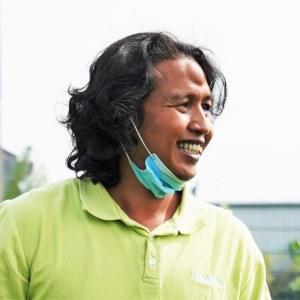Rikolto has partnered with Preferred by Nature on a CISU (Civil Society in Development)-funded project to introduce sustainable rice cultivation methods and improve smallholder farmers livelihoods in Central Java Province in Indonesia. The project has been taking place since April 2021 in three districts: Boyolali, Klaten and Sragen, targeting 100 conventional rice farmers per district.
Reducing rice’s environmental impacts and improving farmers’ livelihoods in Central Java
Reducing rice’s environmental impacts and improving farmers’ livelihoods in Central Java
The traditional rice cultivation method requires about 40% of the world's irrigation water, putting intense pressure on sometimes scarce water resources. For every kilogramme of rice, farmers in Java Province, Indonesia, use an average of 1,432 litres of water. This is done using an irrigated lowland production system used by most rice farmers in Java. Common practices also often overuse agrochemicals that further degrade water quality, damage the ecosystem and harm human health. But while rice contributes to climate change, it is also a victim. The impacts of climate change, such as drought, floods, high temperatures and rising sea levels, are all direct threats to rice producers.

As rice remains a low-priced crop, producers in Central Java lack an incentive to adopt more sustainable practices. Many smallholder farmers are still unaware of the benefits of sustainable rice farming methods and the technical knowledge to implement them. Through its rice programme and CISU collaborative project, Rikolto is working to ensure that rice production benefits farmers economically as well as the environment. In this project, we focus on delivering Training of Trainers (ToT) to pass the knowledge further to more farmers in the local area and conduct demonstration plots through Farmer Field School (FFS) activity.
Introducing the Sustainable Rice Platform (SRP) Standard through ToT and Demonstration Plots
The training for farmers focuses on introducing the SRP (Sustainable Rice Platform) standard - principles developed by a global multi-stakeholder partnership to promote resource-use efficiency and climate change resilience in rice systems, both on-farm and throughout value chains. The materials cover farm preparation, nutrition, pest and disease management, water management, and harvesting and post-harvesting. In farm preparation, farmers learn the importance of soil fertility, as well as how to measure and examine it. Nutrition management provides knowledge on how to properly manage fertiliser according to the needs of the soil. Farmers also learn how much water they need based on the growth stages of the rice, thereby using less water for rice cultivation. In the harvest and post-harvest, we discuss healthy rice production and possible contaminants in the rice grains.
Throughout this project, 30 key farmers from each targeted region will receive direct training from Rikolto. Once they become trainers, they will train 70 additional farmers in the area, so that 100 farmers in total are trained in each of the three regions (300 total). Rikolto will work closely with each of the 30 farmers to develop a plan for how and when they will train additional farmers in their local village and monitor the training of additional farmers.
Since 2018, Rikolto's rice programme in Indonesia has been implementing demonstration plots as an educational tool to promote sustainable rice cultivation to farmers. A demo plot is a field used primarily to try or experiment with new agricultural techniques. It has proven to be an effective educational tool for rice farmers to practise and observe how the SRP principles can improve rice production compared to using traditional methods. During the COVID-19 pandemic, where activities and interactions are limited, a demonstration plot also serves as a solution for Rikolto to assist farmers in small groups.

"A demo plot is an important socialisation tool for farmers to imitate or practise the principles of SRP, so that they can replicate and apply them in subsequent production."

By switching to sustainable practices, rice farmers can command higher prices by selling high quality rice and mitigate the environmental impacts to ensure their long-term livelihoods. Introducing the SRP Standard and changing the mindset of smallholder farmers in Central Java still needs time, continued socialisation, and assistance.
From our years of experience working directly with farmers, we learned that providing smallholder farmers with access to practical and localised information help them understand and implement sustainable practices best suited to their context and realise how it can directly benefit their own livelihoods. Rice could be grown more efficiently – reducing unnecessary water, agrochemicals, and other inputs while sustaining or increasing current yields. The farmers in Central Java could produce at lower cost, increase their net income from selling higher quality and healthier rice, and protect their health while also reducing the environmental footprint of rice cultivation.
Reaching more farmers and influencing policy makers
Rikolto's global rice programme works in 9 countries in Asia and Africa to ensure sustainable rice for all, reducing greenhouse gas emissions and improving market access for farmers. At Rikolto, we realise the importance of a multi-sectoral partnership to promote the sustainable rice agenda. Since 2019, we have collaborated with Preferred by Nature and others to advocate to the Indonesian government and promote the adoption of the SRP standard, including its designation as a “special” rice category that will allow farmers to receive a higher price.
We have been partnering with local government, farmer organisations, rice millers and other private companies to introduce the SRP rice into the market. We have presented SRP to other NGOs such as API (Indonesian Farmers Alliance), KRKP (People’s Coalition for Food Sovereignty), Penabulu Foundation, ICCO Indonesia, and GIZ Indonesia and we take part in policymaking that supports sustainable rice.















